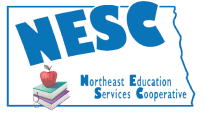LRTC Teacher Visitation Grant
The NESC and all of the seven other North Dakota Regional Education Associations (REAs) seek to be leaders and models in coordinating, facilitating, and marketing high quality professional learning opportunities in accordance with the Learning Forward Standards for Professional Learning.
Definition
Professional Learning is defined as the means by which educators develop new knowledge, skills, and practices necessary to better meet students’ learning needs.
Vision
REAs collaborate with other organizations such as DPI, ESPB, ND University System, ND LEAD Center, Teacher Learning Centers, and schools to deliver high quality professional development (learning) opportunities to schools. Continuous improvement of individuals, schools, and school systems depends on high-quality professional learning for educators focused on developing new knowledge, skills, and practices necessary to better meet students’ learning needs. For professional learning to deliver on this promise, its conception and design must be based on research and successful practice, and professional learning must be consistently implemented and supported. The newly revised Standards of Professional Learning define the essential elements of and conditions for professional learning if improvements in educator effectiveness and student learning are to be realized. Further, use of the standards to plan, facilitate, and evaluate professional learning, promises to heighten the quality of educator learning, performance of all educators, and student learning.
Standard for Professional Learning
Learning Communities: Professional learning that increases educator effectiveness and results for all students occurs within learning communities committed to continuous improvement, collective responsibility, and goal alignment.
Leadership: Professional learning that increases educator effectiveness and results for all students requires skillful leaders who develop capacity, advocate, and create support systems for professional learning.
Resources: Professional learning that increases educator effectiveness and results for all students requires prioritizing, monitoring, and coordinating resources for educator learning.
Data: Professional learning that increases educator effectiveness and results for all students uses a variety of sources and types of student, educator, and system data to plan, assess, and evaluate professional learning.
Learning Designs: Professional learning that increases educator effectiveness and results for all students integrates theories, research, and models of human learning to achieve its intended outcomes.
Implementation: Professional learning that increases educator effectiveness and results for all students applies research on change and sustains support for implementation of professional learning for long term change.
Outcomes: Professional learning that increases educator effectiveness and results for all students aligns its outcomes with educator performance and student curriculum standards.



